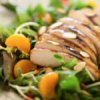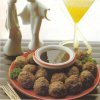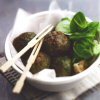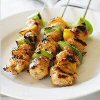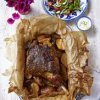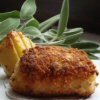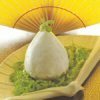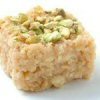6 mins
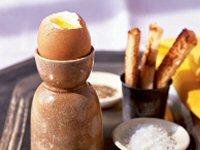
Ingredients for Boiled Egg
Currently displaying quantities in US Imperial Measurements
How to Cook Boiled Egg
- There are two or three acceptable methods of boiling an egg. The following is the most reliable way...
- Put about 2" - 3" (5cm - 7½cm) of water in a pan. Bring the water towards the boil. Once the water just begins to bubble, gently lower your egg(s) into the water on a spoon. Bring the water up to boiling point and continue to boil, cooking for exactly five minutes from the moment you placed your eggs in the water. Remove the eggs from the pan and devour immediately (or gently crack one end to prevent further cooking inside the shell).
- This method will provide you with an egg that has a soft yolk and a firm white. If you prefer your eggs softer or harder, you can decrease or increase the cooking time to suit your personal tastes. Always be sure that there is sufficient water in the pan to cover the eggs while they are cooking.
- An alternative method is to place your eggs in a pan and cover with cold water by about ½" (1cm). Place over a high heat and as soon as the water is boiling, reduce the heat and simmer for 4 minutes. Naturally, you should serve with fingers of buttered toast!
- VARIATIONS: To turn a soft-boiled egg into a hard-boiled egg (for sandwiches or salads), cook for 2-3 minutes longer (seven or eight minutes instead of five). Once cooked, remove the shell. This is best done by immersing the egg in cold water to quickly cool it, then roll it gently in the palms of your hands to crack the shell. This can then be carefully peeled away (and the job is made easier if you keep the egg or your hands wet).
- Hard-boiled eggs can be stored (with the shells still on) in a refrigerator for 4 or 5 days (but do not try to freeze them). If, for any reason, your boiled eggs get mixed up with your fresh eggs, you can tell the difference using the 'Graham Spin Test'! Place the egg on a flat surface and spin it. If is spins and slows down evenly, it is hard-boiled. If it spins and slows down erratically, it has not been cooked.
 GRAHAM'S HOT TIP:
GRAHAM'S HOT TIP:
To avoid the shell cracking when you put an egg in hot water, remove it from the fridge a little while before using to allow it to approach room temperature.
When boiling an egg, lower it gently into the pan using a spoon, just before the water actually boils. By adding a little vinegar to the water prior to putting the eggs in the pan, you will avoid any egg leaking out in the event that the shell is slightly cracked.
Reviews of Boiled Egg
 August 12 2014 August 12 2014Nice to know there are still places where beginners can learn the essentials. Well done! Geoff (6 reviews) |
What To Eat Tonight
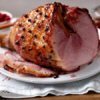
The traditional Sunday Lunch is not a thing of the past - it is making a comeback. When the family gets together for something special.

Many people think that Japanese recipes are complex and need expert tuition. Not necessarily so! Our range of recipes are so easy.
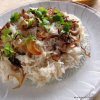
Indian food is now the most popular type of food takeaway in Britain. And not without reason because good Indian food is quite sublime.
Other Egg Recipes
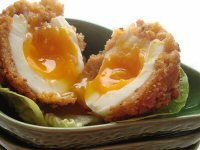
The Vegetarian Scotch Egg is a great cold addition to a buffet, with a salad, in a picnic, as a snack or hot with French Fries.

These egg boats are a breakfast favorite because they literally take less than 5 minutes to prepare. Sourdough baguettes filled with lots of comfort!
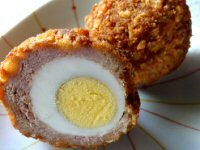
Scotch Egg is a great addition to a buffet, with a salad, in a picnic, as a snack or hot with French Fries. Not many people know how to make their own
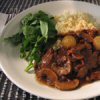 Boeuf à la Bourguignone
Boeuf à la Bourguignone 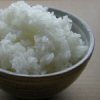 Boiled Rice
Boiled Rice 